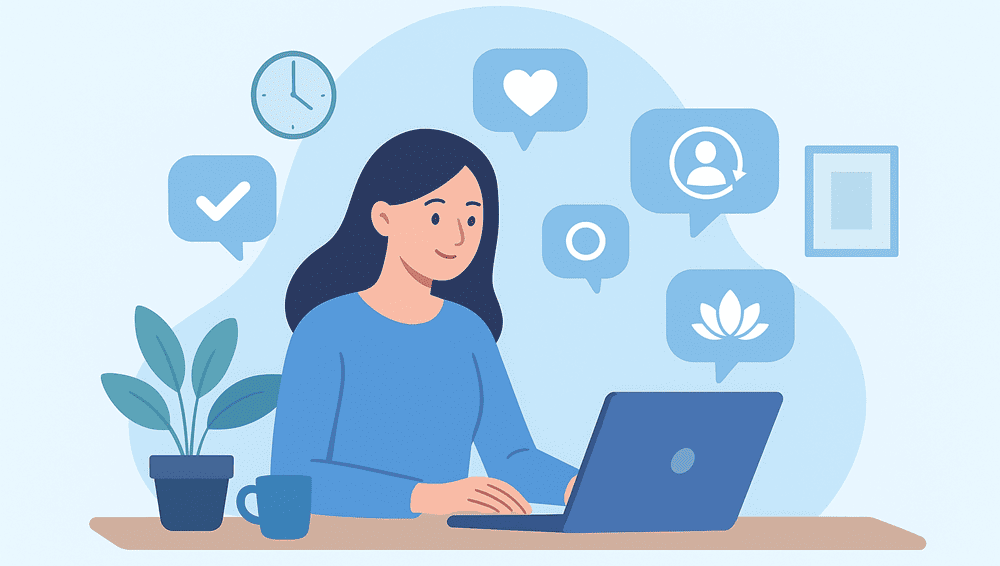Remote work is no longer just an option, it has become a core part of how modern organizations operate. While remote setups offer flexibility and independence, they also bring unique challenges: isolation, blurred work-life boundaries, increased screen fatigue, and heightened remote work stress. Employers around the world are now asking: How do we protect mental health and maintain engagement in remote teams?
One powerful answer is AI coaching, a new form of support that combines technology with human empathy to guide employees toward healthier habits, resilience, and improved mental well-being.
The Rising Importance of Remote Worker Wellness
According to Gallup, nearly 45% of employees now work remotely at least part-time. This shift has been linked to higher productivity but also to rising rates of burnout and disconnection. Remote employees often report:
- Lack of social support: Missing in-person interactions can increase feelings of loneliness.
- Work-life imbalance: Without clear boundaries, work hours often spill into personal life.
- Mental fatigue: Longer screen time and constant digital communication cause cognitive overload.
These challenges highlight why remote worker wellness needs to be addressed not only through HR policies but also through personalized, accessible, and continuous support. Traditional solutions like workshops or one-off webinars don’t always fit the remote environment. That’s where AI remote coaching is making a difference.
What Is AI Coaching?
AI coaching is the use of intelligent, conversational systems that guide employees through their wellness journeys. Unlike generic wellness programs, AI-powered coaching tools deliver personalized advice in real time.
Imagine logging into your company’s chat app during a stressful day and receiving a check-in message from an AI wellbeing coach. This coach can suggest breathing exercises, track mood patterns, remind you to take micro-breaks, and even escalate issues to human support when necessary.
Far from being robotic, the best AI coaching platforms like Wellbeing Navigator’s Coach Nova are designed to interact empathetically and adapt to each user’s unique needs.
How AI Coaching Supports Remote Worker Well-Being
Let’s explore the ways wellbeing AI for remote teams provides both practical and emotional support.
1. Personalized Stress Management
Remote workers face unpredictable challenges: noisy home environments, back-to-back video calls, or the pressure of working across time zones. AI coaches help by offering personalized strategies such as mindfulness reminders, break suggestions, or digital detox prompts based on each worker’s daily patterns.
This approach resonates with proven practices in Workplace Mindfulness, where small, guided practices create big improvements in focus and calmness.
2. Building Consistency with Micro-Check-Ins
One of the biggest issues in remote setups is the lack of consistency in wellbeing routines. AI coaching provides short, regular nudges—for example:
- “You’ve been in meetings for 3 hours. Want to stretch for 2 minutes?”
- “It’s 6:30 pm. Let’s plan a cut-off to prevent work spillover.”
These small interventions reduce remote work stress and help employees build sustainable habits over time.
3. Real-Time Emotional Support
Unlike traditional Employee Assistance Programs that require booking appointments, AI coaching offers instant access to virtual mental health support. Whether it’s frustration after a tough meeting or anxiety before a presentation, employees can open their app and engage with a digital coach right away.
For deeper needs, AI can also guide workers toward structured methods such as AI-Powered CBT, combining cognitive behavioral techniques with real-time, AI-driven guidance.
4. Data-Driven Insights for Employers
AI coaching doesn’t just help employees individually it also empowers organizations. Aggregated (and anonymized) insights can reveal trends:
- Which teams are experiencing the most fatigue?
- What time of day stress levels peak?
- How often are employees skipping breaks?
With these insights, HR leaders can take proactive measures instead of reactive fixes, leading to stronger engagement and retention.
Why AI Coaching Works for Remote Teams
Always Available
Remote employees work across time zones. An AI wellbeing coach is available 24/7, offering support when human managers or HR staff aren’t online.
Scalable Across Organizations
One human coach can handle only so many employees. AI, however, can scale across thousands of workers while still delivering personalized wellbeing AI experiences.
Non-Judgmental and Confidential
Some employees hesitate to share struggles with managers. AI coaching provides a safe and stigma-free space, encouraging honesty about stress, fatigue, or burnout signs.
Complements Human Coaching
Far from replacing human connection, AI acts as the first line of support. It handles everyday stress while flagging more serious concerns to trained professionals. This blended model represents the future of virtual mental health.
Case Example: A Remote Marketing Team
Consider a global marketing agency with 200 remote employees. After months of virtual collaboration, managers noticed signs of burnout, missed deadlines, reduced creativity, and rising sick days.
By adopting an AI remote coaching platform, the company introduced:
- Daily mood check-ins for all staff
- Personalized nudges to encourage breaks and exercise
- On-demand AI coaching sessions for stress and focus
Within six months, the company saw:
- A 30% drop in reported stress
- Higher productivity during peak hours
- Improved employee satisfaction scores
This case reflects how Transforming Challenges Into Growth can become a reality when organizations use the right digital wellness tools.
The Future of Remote Worker Well-Being
The shift to hybrid and remote work is not going away. In fact, studies suggest that more than 70% of employees prefer flexible arrangements. For companies, this means investing in remote worker wellness is no longer optional—it’s a competitive advantage.
AI coaching is at the forefront of this transformation because it:
- Meets workers exactly where they are—online
- Adapts to diverse roles and time zones
- Scales affordably for small and large organizations alike
Looking ahead, we can expect AI wellbeing platforms to integrate even more features:
- Voice-based AI coaching within collaboration tools
- Predictive analytics that detect burnout before it happens
- Gamified wellness challenges tailored to team dynamics
Practical Steps for Companies Adopting AI Coaching
- Assess current challenges: Identify stress hotspots in your remote workforce.
- Choose the right platform: Look for empathetic, scalable, and data-secure AI solutions.
- Encourage usage: Normalize mental health check-ins by embedding them in daily workflows.
- Blend AI with human support: Ensure employees can escalate to counselors when needed.
- Measure outcomes: Track engagement, absenteeism, and wellness scores to prove ROI.
By embedding AI coaching into daily workflows, companies move beyond reactive measures and into a culture where wellbeing is proactive, personalized, and continuous.
Conclusion
Remote work has redefined the way we think about employee wellness. Challenges like isolation, blurred boundaries, and stress require more than surface-level solutions. AI coaching offers a personalized, scalable, and real-time approach to protecting mental health and fostering engagement in distributed teams.
Whether through Workplace Mindfulness reminders, structured practices like AI-Powered CBT, or simply guiding employees in Transforming Challenges Into Growth, AI coaches are proving to be more than just digital assistants—they are vital partners in building healthier, more resilient workforces.
Organizations that embrace this shift will not only improve productivity but also create workplaces where employees truly thrive, no matter where they log in from.







